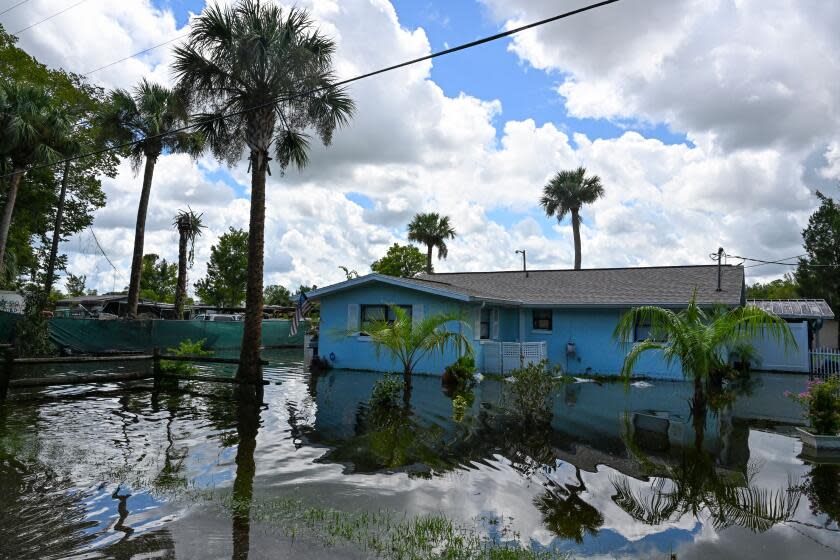Granderson: The costs of climate change are falling on states that can't afford them

- Oops!Something went wrong.Please try again later.
Between 2018 and 2022 many of the states with high rates of poverty — Oklahoma, New York — were also the states that suffered the most damage from extreme weather. A new climate study indicates things are going to get worse for those places and for poor people.
The federal government’s Fifth National Climate Assessment was published last week and concludes that we are literally running out of places to hide.
Right now, according to the report, more than half of all Americans live somewhere that’s projected to have more extreme weather more often. No matter how much humans might try to put a red-blue spin on climate issues, the weather doesn’t care: The climate damage price tags for Texas and California were roughly the same during the span the report assessed.
In 2021, future presidential candidate Ron DeSantis referred to aggressive climate change policy as “left-wing stuff.” But wouldn’t you know it, Florida — the state where DeSantis is in charge — spent the most in those years.
Read more: Granderson: Closing the wage gap for Black women is an investment, not charity
So far this year the country has experienced 25 weather disasters that cost at least $1 billion — a record number. “Left-wing stuff” is a political stance, not a practical one. Here’s a practical concern: To deal with climate damage, Louisiana is spending like Texas, but it’s in no position to do so. Louisiana has a poverty rate of 18.6%, the second highest in the country. Neighboring Mississippi, which has the country’s highest child poverty rate at nearly 28%, will be forced to devote more and more cash toward disasters, an expense it can ill afford.
Even before the climate price tag has ballooned further, the nation is already struggling to come to terms on financial priorities. As Republicans in the House are forever pushing for spending cuts, and reminding us of our $33-trillion debt, it’s easy to forget that people are attached to those cuts in programs such as Medicare and Medicaid: people on fixed incomes, including seniors — 23% of whom live in poverty already; people without a lot in the bank, like much of America. The Motley Fool reported the average American has $1,200 in savings, not a lot of wiggle room.
Read more: Granderson: Can Americans have a not-racist conversation about border security?
The new report on the climate is a cry for help, and yet Republicans in some of our poorest states continue to make it political. We are way past the point of politicking. Recently, about 125,000 homes and businesses in Florida lost power because of heavy rainfall. That’s not “left-wing stuff,” Gov. DeSantis. It’s a major reason insurance companies are abandoning the state.
This is why it is simply not possible to have substantive policy conversations about spending cuts with politicians who rely on climate change denial to get elected. They’re in no position to talk about budgets, because they’re committed to denying one of the biggest elephants in the room.
Read more: Granderson: The Panama Canal is running dry. That's the U.S.'s fault and the U.S.'s problem
And it’s not just the denial that is of concern, but the people most likely to suffer because of it: the poor. The trend of moving to so-called climate havens — cities least likely to have major storms in the future — is monetizing the despair of the wealthy while highlighting the vulnerability of the poor. This means there will be more climate migrants within the U.S., aggravating the competition for homes in some areas and driving up housing costs. That’s not an issue that can be solved by austerity.
Nor can it be helped by nonsensical ramblings about offshore wind farms making whales “crazy.” That was among the most recent comments on climate change from the GOP’s presidential front-runner, Donald Trump. Some states that backed him in 2016 are on the list of biggest spenders on climate damage, even if they are also very poor. You’d think they would be ready for real talk on climate policy — which is not, in fact, just “left-wing stuff.”
I don’t know what all the strategies against climate change should be or where the money will come from. I do know it's impossible to find answers with leaders who benefit from avoiding the problem.
This story originally appeared in Los Angeles Times.

